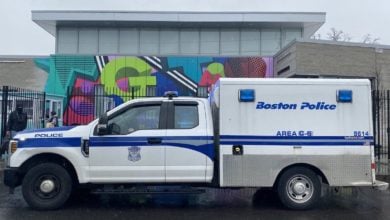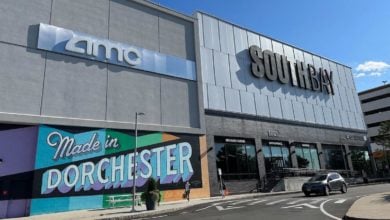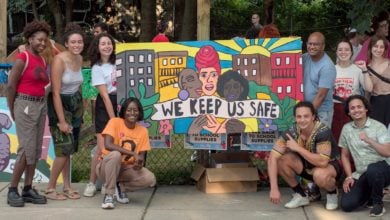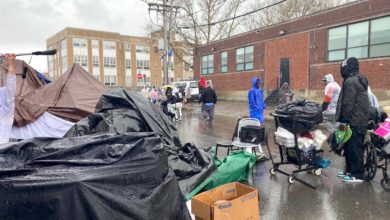During the afternoon of February 22, over 75 people packed a “Black Liberation Study Hall” at Black Market in Boston’s Nubian Square. The event, which was a Black History Month celebration organized by the Boston branch of the Party for Socialism and Liberation, featured a Black revolutionary portrait gallery, a panel discussion about the past, present and future of Black liberation and small group reading circles. This marked the second consecutive February in which the PSL celebrated Black History Month with Black Market, a Black-owned event space that hosts pop-up markets and community events. Last year, Boston PSL organized a Black Panther Party-inspired supply drive in the space.
The event kicked off with a gallery walk. Portraits of 16 Black radicals and revolutionaries hung on the walls of Black Market, along with short biographies. As guests read the various biographies, they discussed their reflections with PSL members and each other. The portrait gallery highlighted radicals who have made massive and distinct contributions to the international Black liberation struggle. Some portraits featured local organizers like Demita Frazier, co-founder of the Boston-based Combahee River Collective — a renowned Black feminist organization whose works on gender, race, class and sexuality still influence organizers today. Others featured highly influential but often overlooked revolutionaries such as Harry Haywood, whose “Black Belt Thesis” introduced the highly influential idea that Black Americans represent a separate oppressed “nation” within the United States.
As guests were served food from local Haitian restaurant Natif Natal, the event transitioned into a panel discussion among four PSL members: moderator Rachel Domond and panelists Andira Alves, Nino Brown and featured guest Eugene Puryear. Panelists discussed the current state of the Black freedom struggle, the connection between socialism and Black liberation, the necessity and potentialities of reparations, the longstanding importance of international solidarity to Black movements and much more. Asked about why it is still important to learn from the history of the Black radical and communist traditions, Alves stated:
“I think we need to be aware of the limitations of … diversity and inclusion, or whatever that means. Here in Boston we have a Black police commissioner, we’ve had a Black governor… it would be really dope for me to say those people have these little identities that I could probably side with, but I have to look at it critically… I think it’s really important to know the distinction that their interest is not our working class interest. In the Black radical tradition, communist tradition, you have to be anti-imperialist. You can’t be on the police department, right? Enforcing policing on neighboring communities. Can’t be promoting luxury development while the costs in Boston are increasing, [while] homelessness is increasing.”
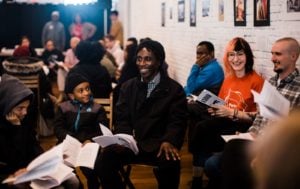
On this point, Brown added “From a radical socialist perspective, we have to actually ask the question of inclusion into what? Inclusion to what end? Does that actually empower Black people?”
The panel spent significant time discussing Black internationalism after Domond mentioned that “Fidel Castro of Cuba was met with a huge supportive crowd when he visited Harlem in 1960, and Robert Williams, who was known for organizing armed self-defense against the KKK in North Carolina, was granted asylum when he visited the People’s Republic of China.” Puryear added further context to the power of such international solidarity:
“The reality of oppression of Black people here in America is such an unbelievable contradiction for this country that goes around the world and says we’re the light on the hill… when you really start to look at it, especially the oppression of Black people in America, you start to realize, well who [is the United States] to be determining what the moral relevancy is of any country? Who are they to be saying who the leadership is of any particular country? And that’s why radical Black leaders are more lifted up outside of the country than in the United States. In the Friday prayers in Iran this week, the Supreme Leader was preaching about Malcolm X. In Turkey, they have multiple streets named after him. I’ve been to Venezuela, I’ve been to many countries, Mexico, everyone knows about the Black Panthers, everyone knows about Malcolm X and people ask you about it… it’s because it speaks so powerfully to the hypocrisy of empire — to me the most maybe relevant thing to remember about this is how dangerous it’s seen to the American ruling class for Black people to be speaking out, the hypocrisy that it exposes, and the reality that that gives people a feeling that they can struggle and they can fight back because they recognize that there’s a group of people in America that might also be willing to ally with them.”
To close the event, participants split up into four study groups, each of which collectively studied and discussed two different Black radicals who have largely been erased from mainstream U.S. history. One of the groups learned about Chuck Turner, a giant in Boston organizing who recently passed away in December 2019. Turner, who was influential in the labor, anti-war, LGBTQ and housing movements, is most renowned for helping lead a successful grassroots struggle in the 1960s against the construction of two proposed highways that would have cut through many working class neighborhoods and destroyed thousands of families’ homes.
Overall, the Black Liberation Study Hall was a tribute to the centuries of struggle carried out by Black freedom fighters around the world. Of course, as speakers noted throughout the event, the best way to pay such a tribute is to pick up the torch of that struggle and move it forward in the 21st century. As Black Panther Fred Hampton said, “peace to you, if you’re willing to fight for it!”


